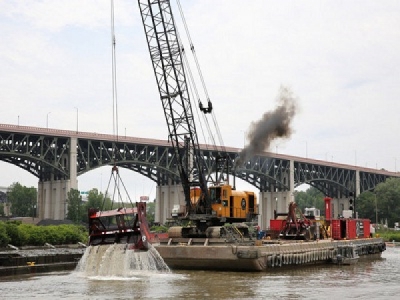
Posted on October 3, 2016
By James F. McCarty, Cleveland Connects
As sediment has built up in the shipping channel, cargo ships have been compelled to lighten their loads to prevent bottoming out or becoming stuck in the river. Due to the lighter loads, the steel mill’s inventory of iron ore pellets has reached a critically low level, the motion said.
“Each passing day decreases the likelihood that ArcelorMittal will be able to recover from that inventory shortfall without having to curtail or idle its plant,” the motion said.
A spokesman for the Army Corps said the agency would not comment on the ArcelorMittal motion, and referred a reporter to the Department of Justice, which is defending the agency in an ongoing federal lawsuit brought by the Ohio EPA and the Port of Cleveland.
The Army Corps is required by law to dredge the shipping channel and Cleveland Harbor to a depth of 23 feet to maintain marine commerce. But the Corps has failed to dredge this year – arguing it isn’t necessary – while contesting the lawsuit.
Federal Judge Donald Nugent has not yet decided whether to order the Army Corps to dredge and dispose of the sediment in a lakefront containment dike. The Army Corps would prefer to dump the dredged sediment directly into Lake Erie, or that someone else pay to dispose of it in a dike.
Ohio’s two U.S. Senators earlier this week wrote to Assistant Secretary of the Army Jo-Ellen Darcy, demanding an end to the Army Corps’ “irresponsible” decision not to dredge.
By refusing to dredge, the Army Corps is breaking an 80-year precedent of annual dredging, the senators said. As sediment builds up in the river, the shrinking shipping channel forces cargo ships to “light load,” impeding commerce and threatening 18,000 workers who rely on the river for their livelihood, the senators said.
The Army Corps also deferred comment to Darcy, who did not respond to a request for comment.
Glen G. Nekvasil, vice president of the Lake Carriers’ Association, said cargo ships carrying limestone have not yet been as severely affected by the shrinking shipping channel as the iron ore boats. But that may change if the channel isn’t dredged, he said.
“This is going to come home to roost for everyone eventually,” Nekvasil said.
ArcelorMittal is responsible for dredging around its docks, but it can’t dredge until the Army Corps completes its work in the center of the shipping channel, said Port of Cleveland President and CEO Will Friedman.
In a typical year, the Army Corps would have dredged the six-mile channel in May, and begun a second dredging this month. An unusually dry spring and high lake levels have kept the shipping channel navigable.
Multiple requests for a response by the Army Corps to the precedence for not dredging the shipping channel for an entire year have gone unanswered.
Last year, Nugent ordered the Army Corps to dredge, stating: “the loss of even one to two feet of depth could result in economic losses to the area in excess of $2 billion annually.”
Meanwhile, the same issues have arisen in the new lawsuit. ArcelorMittal said it cannot afford to “stand by and wait” for the litigants to resolve their differences.
“Immediate dredging is the only hope that ArcelorMittal has for sufficiently increasing the loads of vessels delivering the raw material to its facility in order to continue operating,” the company said in its motion.
Iron ore cargo shipments on U.S.-flagged boats in the Great Lakes were 4.7 percent larger in August than a year ago, and up 4.8 percent over the past year, according to a Lake Carriers’ Association report issued this week.
Limestone shipments for steel plants and construction projects in the Great Lakes in August were down by 6.4 percent compared to a year ago, and coal shipments fell by 17.1 percent compared to August 2015, the report said.
Individual reports are not kept for commerce in Cleveland, Nekvasil said.
Source: cleveland.com





